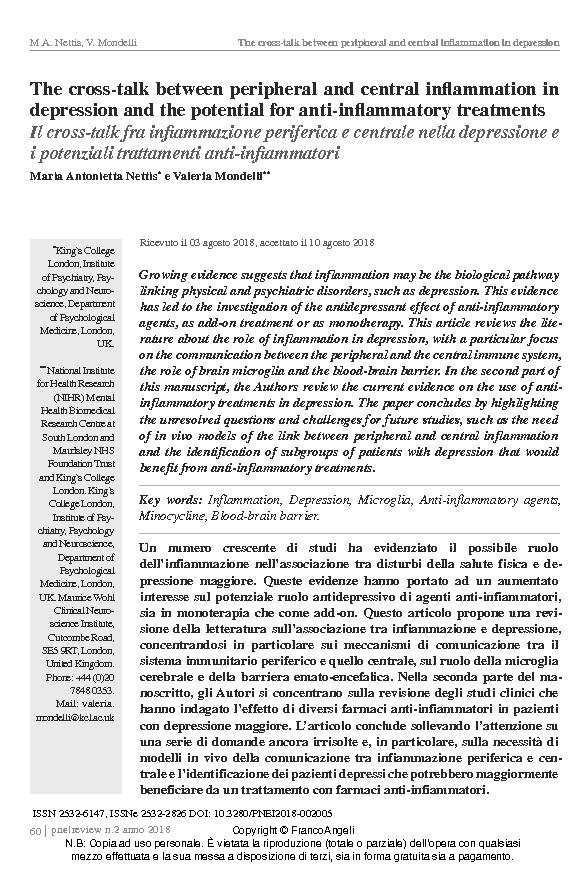The cross-talk between peripheral and central inflammation in depression and the potential for anti-inflammatory treatments
60-71 p.
Growing evidence suggests that inflammation may be the biological pathway linking physical and psychiatric disorders, such as depression. This evidence has led to the investigation of the antidepressant effect of anti-inflammatory agents, as add-on treatment or as monotherapy. This article reviews the literature about the role of inflammation in depression, with a particular focus on the communication between the peripheral and the central immune system, the role of brain microglia and the blood-brain barrier. In the second part of this manuscript, the Authors review the current evidence on the use of antiinflammatory treatments in depression. The paper concludes by highlighting the unresolved questions and challenges for future studies, such as the need of in vivo models of the link between peripheral and central inflammation and the identification of subgroups of patients with depression that would benefit from anti-inflammatory treatments. [Publishers' text].
Un numero crescente di studi ha evidenziato il possibile ruolo dell'infiammazione nell'associazione tra disturbi della salute fisica e depressione maggiore. Queste evidenze hanno portato ad un aumentato interesse sul potenziale ruolo antidepressivo di agenti anti-infiammatori, sia in monoterapia che come add-on. Questo articolo propone una revisione della letteratura sull'associazione tra infiammazione e depressione, concentrandosi in particolare sui meccanismi di comunicazione tra il sistema immunitario periferico e quello centrale, sul ruolo della microglia cerebrale e della barriera emato-encefalica. Nella seconda parte del manoscritto, gli Autori si concentrano sulla revisione degli studi clinici che hanno indagato l'effetto di diversi farmaci anti-infiammatori in pazienti con depressione maggiore.
L'articolo conclude sollevando l'attenzione su una serie di domande ancora irrisolte e, in particolare, sulla necessità di modelli in vivo della comunicazione tra infiammazione periferica e centrale e l'identificazione dei pazienti depressi che potrebbero maggiormente beneficiare da un trattamento con farmaci anti-infiammatori. [Testo dell'editore].
-
Articles from the same issue (available individually)
-
Information
ISSN: 2532-2826
KEYWORDS
- Infiammazione, Depressione, Microglia, Anti-infiammatori, Minociclina, Barriera emato-encefalica
- Inflammation, Depression, Microglia, Anti-inflammatory agents, Minocycline, Blood-brain barrier



